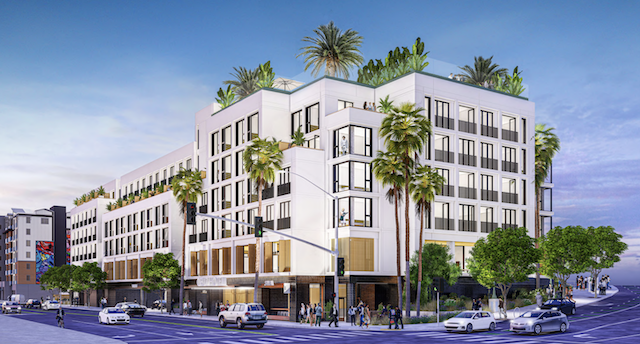The Santa Cruz Planning Commission approved the first downtown hotel north of Laurel Street in Santa Cruz in over 90 years on February 15th. Two city-owned lots will be merged with three private parcels on Front Street to build the hotel. The six-story hotel will have 232 rooms, three rooftop pools, three bars and facilities for conferences.
The commission unanimously increased the payments developer SCFS Venture will make to community groups from $15,000 to $50,000 for the Santa Cruz Hostel Society and $25,000 to $50,000 for the Santa Cruz Boys and Girls Club The hotel will also provide free wifi, a bike share program and access to conference facilities for local nonprofits . These “voluntary conditions” are dependent on the project not being appealed to the Coastal Commission, according to the draft of the measure.
Land-use consultant Owen Lawlor, who is a partner in SCFS Venture, the New York developer, said the hotel would contribute to the business downtown and fulfill the city’s longtime plans to integrate the river into downtown. Also the hotel would contribute two million dollars to the city under the Transient Occupancy Tax, according to Lawlor.
Lawlor’s projects surround the future site of the hotel: Anton Pacific is almost finished across the street and the Riverfront Apartments whose foundations are currently being dug will soon rise.
“These projects that we are working on are the beginning of reconnecting the downtown to the river and that is something that for at least half a century, the community has spoken about in its general plan so it is an exciting time,” said Lawlor.
Lawlor imagines the hotel becoming another community meeting place like Abbott Square. A public alley will connect Front St. to the river walk; People will be able to eat near the riverwalk at the restaurant, and the bars inside and outside would be open to the public.
Unlike housing developments which are constrained by state-law, approval of hotels is governed by local ordinance.
The Cruz Hotel proposal is possible because of the city council’s decision in October to lift height limits downtown for non-housing uses. The 50 foot height limit for non-housing was raised to the 70 foot cap allowed for housing downtown. In return, the city agreed to charge the developer five dollars a square foot for all construction over the old 50 ft limit.
This would amount to $228,000 for the Affordable Housing Trust Fund, according to the planning commission’s report.
The plans for the hotel come in the aftermath of the downtown expansion plan, which would expand the downtown district across the street. The plan as proposed early last year legalizes 1,600 housing units and buildings up to 12 stories high south of Laurel. However, the passage of Measure M would prevent the council from changing city zoning or increasing building height, unless taken to a vote.
Thus if Measure M passes on March 5th, the extra height would have to be overturned by the city council or challenged in court. According to the measure, the prohibition on zoning changes would be retroactive from June 1st, 2023.
During the public portion of the meeting, members of the hospitality worker’s union, Unite Here, Local 19 told the commission they were upset because the hotel will not be unionized.
“Every aspect of the hotel project seems to be meeting the bare-minimum, nothing more,” said Todo of Unite Here. The $5 fee for affordable housing should be raised too, she said.
District 3 candidate Joy Schendledecker, said that the city should not sell the city owned lots because the “community benefits” offered by SCFS Venture are one time cash payments.
““How about we keep our public land and charge ground rent? Once we privatize our community assets, we never benefit from them again in the same way,” said Schendledecker.
Commissioner Rachel Dann, who lives downtown, worried about the project’s lack of parking for employees.
An underground parking garage for 214 cars with a robotic-car retrieval system is planned, but the hotel will not have parking for the roughly 130 employees. Bike-share and the new Metro Center will provide transit access, according to Lawlor.
Commissioners expressed reluctance about changing the resolution too much before the city council, considering the city is still negotiating with the developer and the Coastal Commission.
Lead Planner Lee Butler said the biggest issue is how much will be contributed to the “low cost visitor accommodations,” which is required by the California Coastal Commission without compromising the financial viability of the project. The developer has to make money, he said.
In an email, Rainey Graeven of the Coastal Commission explained that the commission typically prefers that “lower-cost accommodations be provided onsite.”
The project currently does not have these rooms. Furthermore, the draft of the approval contains language that nullifies all “public benefit conditions” if it is appealed by the Coastal Commission.
“We are coordinating with the Applicant and the City on recommended measures on this issue [low cost rooms] as well as the contribution to the City’s affordable housing trust fund,” she said.














Were in a housing crisis so lets build a luxury hotel on public land. Way to sell out our town City Council. Follow the money and you’ll see that the council and mayors office is not working for the citizens.